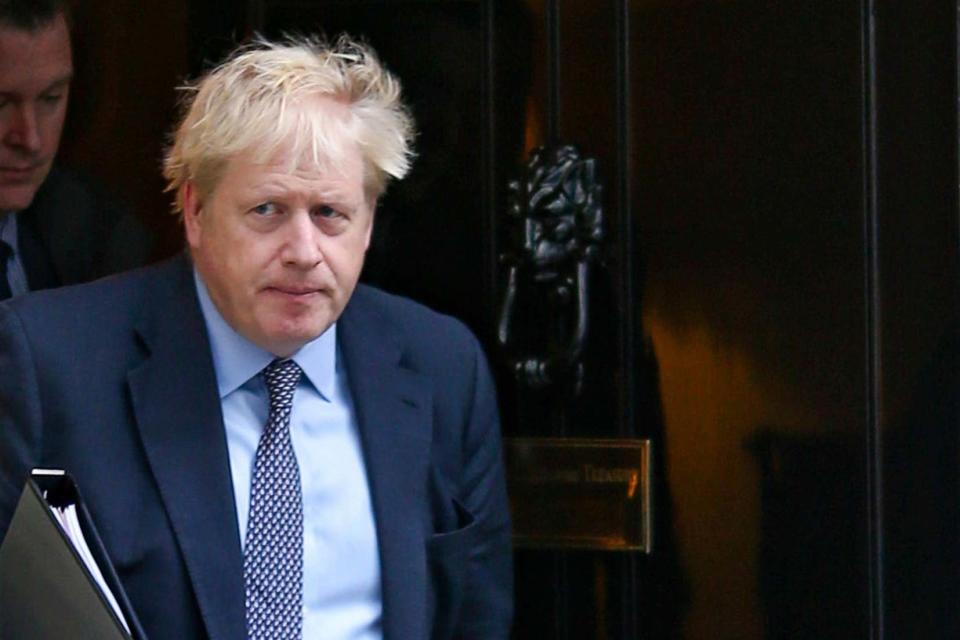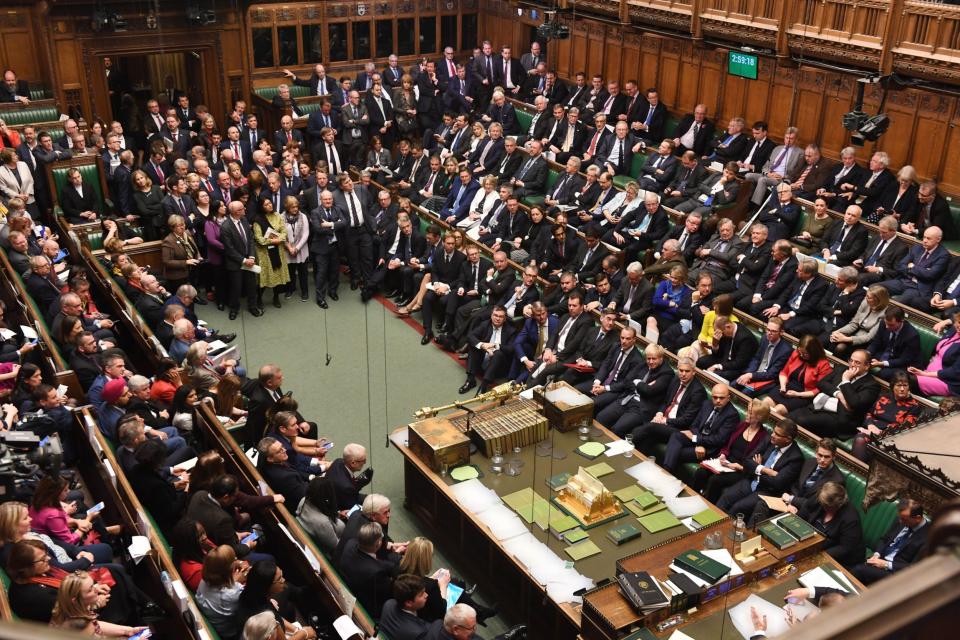What time is the Brexit vote tonight on Boris Johnson's Withdrawal Agreement?

Boris Johnson is debating with MPs in the House of Commons in a last-ditch push to get Brexit done by October 31.
The Prime Minister is facing two crucial votes in Parliament this evening: the first on his Withdrawal Agreement Bill “in principle”; the second on his proposed timetable for getting it ratified.
Mr Johnson is urging MPs to back the bill which will enshrine his deal with the EU into UK law, but he faces tough challenges from both Opposition MPs and those within his own party.
As current Brexit plans hurtle towards what could be the ultimate cliff edge, the Standard takes a look at how the coming days will pan out in Parliament.
First, we set out the key events over the next few days, before recapping the moments which led to this crunch point.
The next three days a nutshell
Today:
The Commons will first vote on the "in principle" second reading Withdrawal Agreement Bill (WAB) - a treaty which enshrines the PM’s Brexit deal into UK law.
There will then be a vote on what is known as the “programme motion” - this is essentially the parliamentary timetable for getting the WAB passed.
The vote on the second reading is expected from around 7pm. Up to three hours of debate in what is known as the Committee Stage could follow if the Bill clears its second reading and the programme motion approved.
Tomorrow:
MPs will continue their debate on the WAB during the Committee Stage.
At this point, MPs will have the opportunity to table amendments to the bill.
They could sit in the House of Commons until 1am.
Thursday:
The amended WAB will be put to a third reading in the Commons, followed by a crucial vote by MPs planned for around 7.30pm.
Friday:
If the WAB does pass through the Commons, it will then move to the House of Lords on Friday for what is expected to be two days of debate.
Further amendments could be tabled at this stage, but the Lords are unlikely to reject the bill in its entirety.
Next Monday, October 28:
Once the WAB passes through the upper house, it will go back to the Commons, where any Lords amendments will be voted on again in a process known as ping pong.
If the bill passes this final hurdle, it could get royal assent as early as Tuesday, in time to meet the PM’s October 31 deadline.

How did we reach this point? A recap of what's happened since the PM struck a deal with the EU:
‘Super Saturday’, October 19
He was then forced under the terms of the so-called Benn Act to send a letter to the EU requesting a three-month Brexit delay.
However, he did so begrudgingly - refusing to sign the photocopied note and insisting he would not negotiate an extension.
Yesterday, October 21
After cancelling the meaningful vote on Saturday, the Government hoped to put its Brexit deal to MPs on Monday instead.
But Speaker of the House John Bercow rejected their request, saying it would be “repetitive and disorderly” to do so.
He cited House rules which prevent the same motion from being put forward over and over again.
Since Monday’s motion was the “same in substance” as Saturday’s, Mr Bercow said he could not approve it under this strict convention.
Later in the day, the Government published its 110-page Withdrawal Agreement Bill (WAB), along with 124 pages of explanatory notes.
Leader of the House of Commons Jacob Rees-Mogg then set out fast-track plans for MPs to conclude their consideration of the bill in just three days.
What exactly is the Withdrawal Agreement Bill?
The WAB is the legal part of the PM's Brexit deal that will take the country out of the EU.
It enshrines in law any agreed transition period, fulfils requirements on the rights of EU citizens in the UK after Brexit, and enables the payment of the “UK’s divorce bill” will the EU.
But it will need the backing of a majority of MPs before it can be passed by peers in the House of Lords.
MPs will be able to vote on amendments or add-ons to the bill during tomorrow's Committee Stage, when a number of key changes are expected to be put forward by the Labour Party.
If the Government can't get the bill approved by Parliament, the default legal position is that the UK will not be able to ratify the PM’s deal. Therefore, the country will face a no-deal crash-out from the EU on October 31.
That is, unless the EU first agrees to extend the Brexit deadline beyond that date.

What key amendments to the withdrawal agreement can we expect during tomorrow’s committee stage?
Second referendum
Shadow Brexit secretary Sir Keir Starmer has said he will whip Labour MPs to support an amendment that would put any deal to a second referendum.
Sir Keir has suggested that such a referendum would offer the British people a choice between staying in the EU and Mr Johnson’s deal, as amended.
However, this amendment is unlikely to pass. As many as 20 Labour MPs could rebel and vote it down and the DUP has confirmed it will oppose it.
Sir Keir Starmer says Labour will table amendment for second referendum
Customs union
Labour is also expected to table an amendment calling for Britain to stay in a customs union with the EU.
This would amount to a major upheaval in Mr Johnson’s current deal, which commits Britain to leaving the EU customs union so it can strike independent trade deals after Brexit.
The amendment is already attracting the support of Labour rebels who were expected to back th PM’s deal but would prefer closer alignment with the EU.
The DUP is also considering giving the deal its support, saying it wants a deal for the “whole of the UK”.
Most of the 21 Tory MPs who had the whip removed are expected to vote against it, but they will require further assurances about the future relationship with the EU.

What's happening in Brussels this week?
The EU must continue to consider the letter, sent on Saturday night by Mr Johnson, begrudgingly requesting an extension to Article 50 and, therefore, a delay to Brexit.
All 27 EU nations must agree to this extension and, on Saturday night, European Council president Donald Tusk said he would now start "consulting EU leaders on how to react".
The EU could set a different length to an extension, either shorter or longer than the three-month one cited in the so-called Benn Act.
But it is understood Brussels is waiting to see whether the WAB makes it through its second reading, scheduled for tomorrow, before confirming whether or not it will offer an extension.
If the PM gets the bill through, there could be a special gathering of EU leaders on October 28.
If the deal needs more time to get through Parliament at that stage, leaders could agree to a short "technical" extension.
If they refuse to grant Britain a delay to Brexit, Parliament will have until October 31 to pass a deal, and the associated legislation, or crash out of the EU without a deal.
Will there be a general election?
Boris Johnson has threatened to pull his Brexit deal and call for an early general election if MPs do not vote for his plans.
The PM told the Commons that he would "in no way allow months more of this" as he called on MPs to work "night and day" to scrutinise his plans and avoid a no-deal departure.
"If Parliament refuses to allow Brexit to happen, and instead gets its way and decides to delay everything until January or possibly longer, in no circumstances can the Government continue with this," he said.
"And with great regret I must say that the Bill will have to be pulled and we will have to go forward to a general election."
But the threat has been dismissed as "childish blackmail" by Liberal Democrat Brexit spokesman Tom Brake.
The Government would require a two-thirds majority in the House of Commons to trigger a general election.
Alternatively, the Government could introduce a short new law specifying the date of an early general election - this would require simple majority rather than two-thirds of MPs.
A more dramatic alternative would be for the Prime Minister to call a vote of no confidence in his own government.

 Yahoo News
Yahoo News 